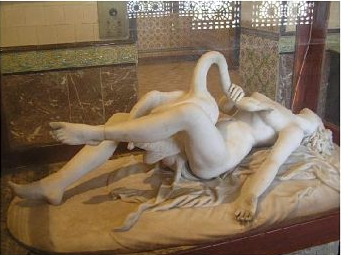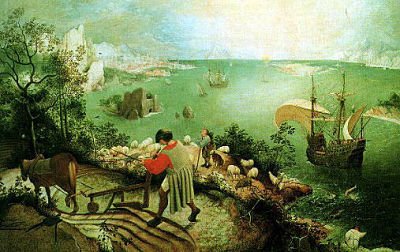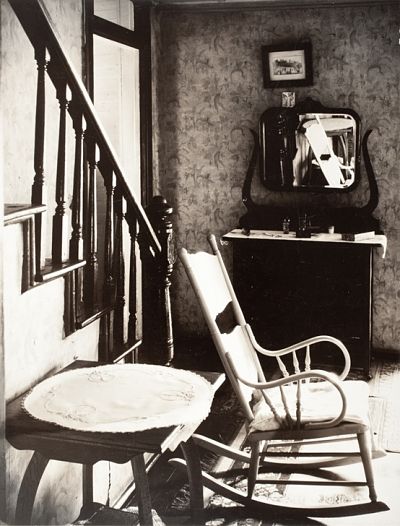No, they’re not acrostics–ekphrastics (sometimes spelled ecphrastics–but doesn’t it seem more Greek with the k?) are written descriptions of a graphic work of art. Perhaps the most famous ekphrastic poem is Auden’s “Musee des Beaux Arts,” about Breughel’s painting, The Fall of Icarus, in which you can just see his leg to the right of the boat as he falls into the water, but no one is paying particular attention:
Musee des Beaux Arts
About suffering they were never wrong,
The old Masters: how well they understood
Its human position: how it takes place
While someone else is eating or opening a window or just walking dully along;
How, when the aged are reverently, passionately waiting
For the miraculous birth, there always must be
Children who did not specially want it to happen, skating
On a pond at the edge of the wood:
They never forgot
That even the dreadful martyrdom must run its course
Anyhow in a corner, some untidy spot
Where the dogs go on with their doggy life and the torturer’s horse
Scratches its innocent behind on a tree.
In Breughel’s Icarus, for instance: how everything turns away
Quite leisurely from the disaster; the ploughman may
Have heard the splash, the forsaken cry,
But for him it was not an important failure; the sun shone
As it had to on the white legs disappearing into the green
Water, and the expensive delicate ship that must have seen
Something amazing, a boy falling out of the sky,
Had somewhere to get to and sailed calmly on.
W. H. Auden
I recently came across a whole issue of Poemeleon, an online poetry magazine, dedicated to ekphrastic poems, many of them interesting. I especially liked these two. The first is about the myth of Leda and the swan. In the myth, Zeus takes on the shape of a swan and rapes (or seduces) the mortal Leda, queen of Sparta, who is married to King Tyndareus. She then gives birth to Helen (who becomes the famous Helen of Troy) and her brother Polydeuces, children of Zeus, and also Clytemnestra and Castor, Tyndareus’ offspring.
 As with the story of Icarus, this myth has inspired a lot of art, including many sculptures in which Leda looks definitely more seduced than raped. Yeats has written a famous ekphrastic, “Leda and the Swan,” that explores this. In the Poemeleon issue, Wendy Taylor Carlisle bravely takes this on, citing a sculpture by Botero. (I like this depiction, from a museum in Gwailor, India, better than Botero’s.)
As with the story of Icarus, this myth has inspired a lot of art, including many sculptures in which Leda looks definitely more seduced than raped. Yeats has written a famous ekphrastic, “Leda and the Swan,” that explores this. In the Poemeleon issue, Wendy Taylor Carlisle bravely takes this on, citing a sculpture by Botero. (I like this depiction, from a museum in Gwailor, India, better than Botero’s.)
Her Husband
– after Leda, sculpture, Fernando Botero
When what had happened to his wife was done,
when he glimpsed her thawed face, its features softened
a touch self-satisfied, no matter how Tyndareus labored
after that, he couldn’t take the thing for rape.
Each time the palace gossip turned to violation
he had to make himself remember, whatever happened later,
he was her first. She loved his Spartan ways.
She loved him best. He was obliged by this to blame
her half-smile on the will of Gods instead of calling
for a whip when his heart twisted in his chest.
But then the towers flamed in Helen’s eyes
and then they dragged the corpse around the wall,
undid the city with a gift, the war exhausted him at last
and he confessed. That daughter, he said, wasn’t one of his
The other poem I thought worth reprinting here was of a different sort–an imagined narrative for a photo by Walker Evans.
An Unemployed Worker’s Home
Morgantown, West Virginia
Walker Evans, July 1935
It’s the one in the mirror always sucks up the light
Gives some back to the real rocker by the newel
But you know, things in mirrors are always doing backwards
I can’t pin up my hair in front of no mirror—
Just do it by feel, like after dark
That’s what it is—mirrors make everything but them be dark
And around the edge, where everything tilts there,
It’s like looking at two sides of something at the same time—
You ever seen a pond with water striders on top
And you can see the leaves and maybe a turtle down in it?
There’s more in mirrors than most folks think—some,
I know some as keeps them covered with a scarf,
Especially at night you know
Anyway that rocker’s a good one—see how it’s tall in the back—
You can lean your head back when you’re not working on anything
Lean your head back and rest it there with your elbows
On those smooth arms and just let the song take you
In winter I move the rocker close up to the fire
Fire’s another thing that mirror takes
But this is where we keep it in summer—
It gets air and light from the doorway
And of course you get a headache, too
When the young’uns come tearing down the staircase—
That’s why there’s no bowl on that table n’more—
They knocked it right off
I realize this is a lot of poetry for one post. Hope it wasn’t too much!


I love Auden. Thanks for posting all of your poetic finds, you are doing a noble service, my friend, noble.
And thanks for all the great pics!
Have you ever wrote a poem about a poem?
If so, lay it on me.
Actually, I have–it will have to be another post. Too long for a comment.